
Our third rewind will focus on AKTI-BAKBAKAN, an interpellation segment where the two parties are allowed to go head to head on ten important issues.
EDCA AND BALIKATAN
Question 1: The Philippines has stated that the purpose of the expansion of the Enhanced Defense Cooperation Agreement (EDCA) and the hosting of the Balikatan military exercises is to protect national security through deterrence. However, several progressive groups have challenged these claims, asserting that more American presence in the country further inflames Chinese aggression. National security is argued not as a binary choice between two imperial powers.
With this, how can the national government protect our national interests without depending on these foreign powers?
CONTEXT:
The Philippines, ever since it was “granted freedom” by the United States, has had a peculiar connection with Washington DC, often signing disadvantageous military and trade deals despite broad public clamor in opposition.
READ MORE: https://sinag.press/news/2022/07/04/fabricating-a-friendship-there-is-nothing-friendly-about-american-imperialism/
Now, with the Enhanced Defense Cooperation Agreement (EDCA) opening even more bases in the Philippines, and the country hosting the largest Balikatan exercises ever with more than 12,000 US troops deployed, China has become more aggressive, and has even threatened the lives of OFWs in Vietnam because of it.
READ MORE: https://edition.cnn.com/2023/04/27/asia/us-philippine-alliance-china-response-intl-hnk/index.html
Groups have even pointed out that, in the midst of all this, Marcos is trying to form even more treaties. Just recently, on Labor Day, Marcos was out of the country to meet Joe Biden in Washington.
READ MORE: https://twitter.com/PahayagangKAPP/status/1653013938152554496
ANSWERS:
STAND UP says that we should be firm in asserting international law and the recent Hague ruling that supports our claims to territories in the West Philippine Sea. Moreover, they suggest leveraging alliances with other nearby countries in resisting imperialism incursions.
The party also highlighted the role of the masses in fighting for sovereignty, as they say sovereignty is not given; it is defended and won by opposing imperialism and asserting an independent foreign policy.
UP ALYANSA likewise said that, contrary to the US’s claims that they are here for defense, they are just using the country as a pawn in a geopolitical chess match against China. They lament the dependence on imperialist powers for defense, and say that we should depend on nationalist powers instead.
Agreeing with STAND, they said that it was essential to build a broad alliance of defenders to assert sovereignty and repel imperialist aggression.
CHARTER CHANGE
Question 2: Some advocates for charter change have pointed out that problems existing in the current 1987 Philippine Constitution is enough reason for a charter change.
Do you agree with the need for charter change to rectify problems in the 1987 Philippine Constitution? How should such changes look like if you do agree? If you don’t, what are potential alternatives to charter change?
CONTEXT:
After several marathon sessions geared towards railroading the charter change, Congress has approved the bill pushing for Charter Change through a Constitutional Convention. This, critics argue, is a clear power grab and must be opposed.
READ MORE: https://sinag.press/news/2023/03/12/huling-tulak-para-sa-cha-cha-sasalubungin-ng-protesta/
But more than the politics behind it, experts have said that charter change is not the answer, and that the state should instead focus on more pressing issues.
READ MORE: https://sinag.press/news/2023/01/28/cha-cha-is-not-a-silver-bullet-2/
ANSWERS:
UP ALYANSA said that while there are still problems with the current constitution, now is not the time to change it. Under the current regime, they said, a push for charter change may just spell an even tighter grip on power for Marcos and his cronies. Instead of charter change, they believe more pressing issues like inflation should be prioritized.
STAND UP, meanwhile, said that charter change had to be opposed completely, because the provisions that it includes will only further liberalize the economy and open it up to foreign exploitation. Alongside the costs merely from the constitutional convention, they say that charter change will greatly hurt the local economy in the long term as well. If they really want to solve the country’s woes, STAND UP says, the government should support genuine land reform and national industrialization.
THE PHILIPPINE LEFT
Question 3: The first year of the Marcos-Duterte administration has been rife with issues affecting the Filipino people such as inflation, rising prices of fuel and goods, unemployment, intensified red-tagging, and unrelenting threats to academic freedom. The Philippine Left has consistently championed the rights of Filipinos and challenged the rule of Marcos-Duterte, but still remains fragmented and overpowered in national government posts.
How can the Philippine Left unite to form a stronger opposition?
CONTEXT:
The Philippine Left, while united against the same enemy, especially under a Marcos-Duterte Regime, its history is fraught with internal power struggles and conflicts. Ideological allies have fought for years, not only in word wars, but in some cases, outright physical brawls.
But with the political situation only becoming more dangerous, the Left has made key alliances. Just recently, for example, different labor unions from the Left joined forces in one major mobilization in Mendiola.
LOOK: https://twitter.com/PahayagangKAPP/status/1652873537370337280
ANSWERS:
Both parties said that by identifying basic points of unity, they will be able to build a stronger alliance. As ALYANSA said, while they may differ on stances, they are one in opposing the regime’s unjust policies and fighting for the people. In the same vein, STAND UP says that they believe the Philippine Left must “Unite, Struggle, Unite,” or start with fundamental points of unity, accept disagreements and points of contention, but ultimately go back to common ground.
ECO-IMPERIALISM
QUESTION 4:
The environmental sector continues to face several challenges. Some of the most pertinent threats are the Kaliwa Dam, PAREX, BuCor’s supposed plan to relocate to Masungi Georeserve, land reclamation, and the recent Mindoro Oil Spill. Most of these endeavors are backed by foreign ‘developed’ states which disproportionately aggravate the global climate crisis, to the detriment of ‘developing’ states such as the Philippines.
To what extent are developed countries accountable for Philippine environmental issues vis-a-vis the national government? How can we hold them accountable?
CONTEXT:
The effects of climate change have only worsened in previous decades especially for countries in the Philippines that are particularly vulnerable because of geography. These effects, progressives argue, cannot be blamed on us, and bigger countries should be shouldering the burden of mitigating them.
ANSWERS:
UP ALYANSA highlighted the problem of foreign ownership, saying that by allowing these harmful foreign corporations, the state is complicit in the damage that these corporations do. These projects, said UP ALYANSA, are not even really for the development of local communities.
Likewise, STAND UP underscored the importance of opposing imperialist plunder in the fight against climate change. The problems we face are attributable to foreign capitalist exploitation, and we can only achieve climate justice by holding them accountable.
THE BOARD OF REGENTS
QUESTION 5
The Board of Regents (BOR) appointed a new UP President in December 2022 and a new chancellor for UP Diliman just last April. The lack of representation of the UP Community in the voting process for the two positions ignited calls to reform the BOR’s undemocratic composition and untransparent administrative processes.
To respond to these concerns, how could we concretely push for the reform of the Board of Regents? What specific reforms can be made?
CONTEXT:
In two major selection processes within the last few months – the selection of the UP President and the UP Diliman Chancellor, the Board of Regents selected a candidate contrary to broad endorsements by different sectors in the community.
READ MORE: https://sinag.press/news/2023/04/03/sectors-back-nemenzo-demand-democratic-chancy-selection-2/
During the chancellorship selection in particular, the community took issue with what seemed to be a disregard for its wishes. The selection meeting itself, for example, was moved twice to Holy Monday, when most students were home for the break.
READ MORE: https://sinag.press/news/2023/03/31/komunidad-ng-up-hindi-kuntento-sa-pure-silence-ng-bor-2/
ANSWERS:
Both parties believe that the current BOR set-up – with only three sectoral regents – cannot be reflective of the needs of the community. They demand more representation. As UP ALYANSA said, the UP Charter of 2008 must be revised to include more sectoral regents. STAND UP agreed, adding that while the BOR may be reactionary, students can still register their calls by leveraging the multi-sectoral alliance of the UP community. Both parties, in the end, highlighted that it was the constituency and not the BOR that should have a final say, as the community is still the biggest and most important stakeholder.
ARTIFICIAL INTELLIGENCE
QUESTION 6:
The fast rise of Artificial Intelligence (Al) and its use for academic matters has challenged educational systems globally. In UP, there have already been cases of academic dishonesty through Al such as ChatGPT, and some faculty have already instituted rather punitive measures against its use.
With this, how should the university’s academic policies adapt to Al?
CONTEXT:
The growing capabilities of artificial intelligence has stoked fears about the future of education. While some see it as a tool that will improve how students learn, others fear that it may undermine education as we know it today. While proponents say that the University should be open to the use of tools like ChatGPT, traditionalists have argued that the University should be stricter in cracking down on its use.
READ MORE: https://phkule.org/article/813/will-ai-chatbots-take-over-education
The parties were asked about this as well during AKTI-BIGLAAN.
READ MORE: https://twitter.com/PahayagangKAPP/status/1655545262855819264
ANSWERS:
The parties are in agreement: while neither party condones academic dishonesty, they also want justice to be restorative. As UP ALYANSA pointed out, it is necessary to find the root cause of cheating using ChatGPT instead of adopting a haphazardly strict policy. The administration must recognize, STAND UP added, that excessively harsh guidelines would stop the accessibility benefits that these tools provide for students that may need them.
THE UP FAIR
QUESTION 7
The 2023 UP Fair was held on-ground after two years of only being held online. UP Fair 2023 was highly anticipated but met with scrutiny and criticism as Upsilon Sigma Phi, a fraternity with a history of fraternity-related violence, was allowed to be a night handler.
Given this issue, how can you address the lapses that compromised the advocacy-driven goals of UP Fair? What changes can be implemented to make future iterations of UP Fair stay true to its essence as a protest fair?
CONTEXT:
UP Fair 2023 was flooded with complaints on several issues: the seemingly commercialized nature of the fair, the handling of complimentary tickets, and especially accepting Upsilon Sigma Phi as a night handler for Polaris.
During the community assessment, several resolutions were raised, including eliminating the bidding process altogether and giving more time for advocacy partners.
READ MORE:https://sinag.press/news/2023/03/23/scrapping-bidding-guidelines-ensuring-community-centric-fair-among-up-fair-dialogue-resols/
ANSWERS:
STAND UP says that UP Fair must do two things: go back to its main campaigns and become more community-based. They said that in doing so, UP Fair can adopt practices from other campuses’ fairs such as Feb Fair in UPLB.
UP ALYANSA, on the other hand, highlighted the need to revise the bidding process for nighthandlers to prevent a case like Upsilon’s. Instead of looking at financial capabilities first, the night handlers’ history, advocacy, current programs, and plans for UP Fair should be front and center.
THE UPCAT
QUESTION 8:
The University of the Philippines is a premier state institution primarily sought after by thousands of applicants across the entire country yearly because of its free tuition system. However, it continues to instill its rigorous admission test and standards, filtering out students who are considered “the cream of the crop.” At the same time, the said test’s conditions are also favorable for affluent participants.
Amid calls for equity, should the UPCAT still be implemented? Do you have any alternative proposals to this system?
CONTEXT: For years, progressives have pointed out that the UPCAT, among other entrance examinations, deprives students of a quality education. Moreover, data shows that the UPCAT is not even a reliable indicator for college performance, and is heavily skewed towards those with economic advantages.
Now, especially after it was temporarily halted during the pandemic, calls to abolish the UPCAT have gathered broader support, with former UP Diliman chancellor Fidel Nemenzo even calling for it as well.
READ MORE: https://twitter.com/PahayagangKAPP/status/1642475844181561345?s=20
ANSWERS:
UP ALYANSA said that the UPCAT fails to truly capture students’ abilities, missing out on many factors such as financial situations. This is why they advocate for a more centralized and needs-based system of admissions that gives students the support that they need to thrive.
STAND UP, likewise, recognizes that the UPCAT has been a hurdle for many students in achieving free, quality, and accessible education. This is why they say that, other than reforms within the UPCAT and the university, we must reform the current education system and reorient it towards nationalist, scientific, and mass-oriented education, where quality learning will come not only from UP, but from all universities.
ON FRATERNITIES
QUESTION 9
At the national level, the death of Adamson University student John Matthew Salilig after being involved in the hazing rites of the Tau Gamma Phi fraternity shocked the entire country. Within the university, there have been several triggering situations in the past that explicitly showed the misogynistic, homophobic, and corrupt culture embedded in the structure of fraternities.
With this, how can we go about challenging the backward cultures and institutions propagated by fraternities? Is the call, “End Frat-Related Violence” still relevant or is it now more appropriate to call for their abolition?
CONTEXT: Following several cases of fraternity-related violence in the University’s history, several groups have asked whether an institution that is, by definition, all male still has a place amid calls to end the macho-feudal culture. From brawls in parking lots against other groups to hazing their own brods, critics say that fraternities should be abolished.
READ MORE: https://sinag.press/news/2022/07/07/violence-has-no-place-in-up/
But others, like UP Diliman Sociology Professor Filomin Guitterez, claim that banning fraternities may not be the best move, as this runs the risk of simply driving groups underground. They point to the fact that in the case of Salilig, fraternities had already been banned in Adamson for years.
READ MORE: https://verafiles.org/articles/vera-files-fact-sheet-fraternities-and-the-unlawful-practice-of-hazing
ANSWERS:
STAND UP says that the call to end FRVs is a call for frats to “change or be left out,” as perpetuating their macho-feudal culture will leave them obsolete. This is this culture, STAND UP says, that must be targeted, because fraternities still have a basic right to organize.
For UP ALYANSA, however, fraternities are problematic at their core because they have always been based on elitism and misogyny. “Why do fraternities exist,” they asked, “and what do they give to society that other organizations do not?” Moreover, they said that these fraternities do not have an absolute right to organize, because these rights stop when they trample on the rights of others.
UP’S ACTIVIST SPIRIT IN THE POST-PANDEMIC
QUESTION 10
The voter turnout in the 2022 University Student Council Elections was the lowest since 2009. The two-year online learning setup has also made many students physically disengaged from on-ground activism. We also see a crisis of engagement and leadership in student formations, thus challenging the full revival of the iconic UP org culture.
As we now face drastic adjustments brought by the transition to face-to-face classes, as student leaders, how can you further revive the vibrant activist spirit of the University of the Philippines?
CONTEXT: Many have complained about what seems to be a dwindling level of political participation among students. After the pandemic, many student leaders have pointed out that the student body is largely unfazed by campus politics, and that fewer students are willing to join mobilizations or run for council.
During the AKTI-BIGLAAN portion, however, both parties said that political participation in the University is in a good state.
READ MORE: https://twitter.com/PahayagangKAPP/status/1655543248621019137/retweets/with_comments
ANSWERS:
UP ALYANSA says that to raise their level of political participation, students must feel included in decision-making in avenues such as consultations. Highlighting Bida Isko, their freshman advocacy program, they said that students should be given opportunities to take part in campaigns themselves to enhance their participation further.
STAND UP, meanwhile, says that activities like the University Freshie Month – not just on the university level, but on the college level as well – where students learn about organizations is essential for enhancing their participation. This, they say, must be coupled with opposing unreasonably-strict org recognition requirements. But most importantly, they say that students will become more politically involved when they realize that their participation should not end within the university, but must serve the broader community.

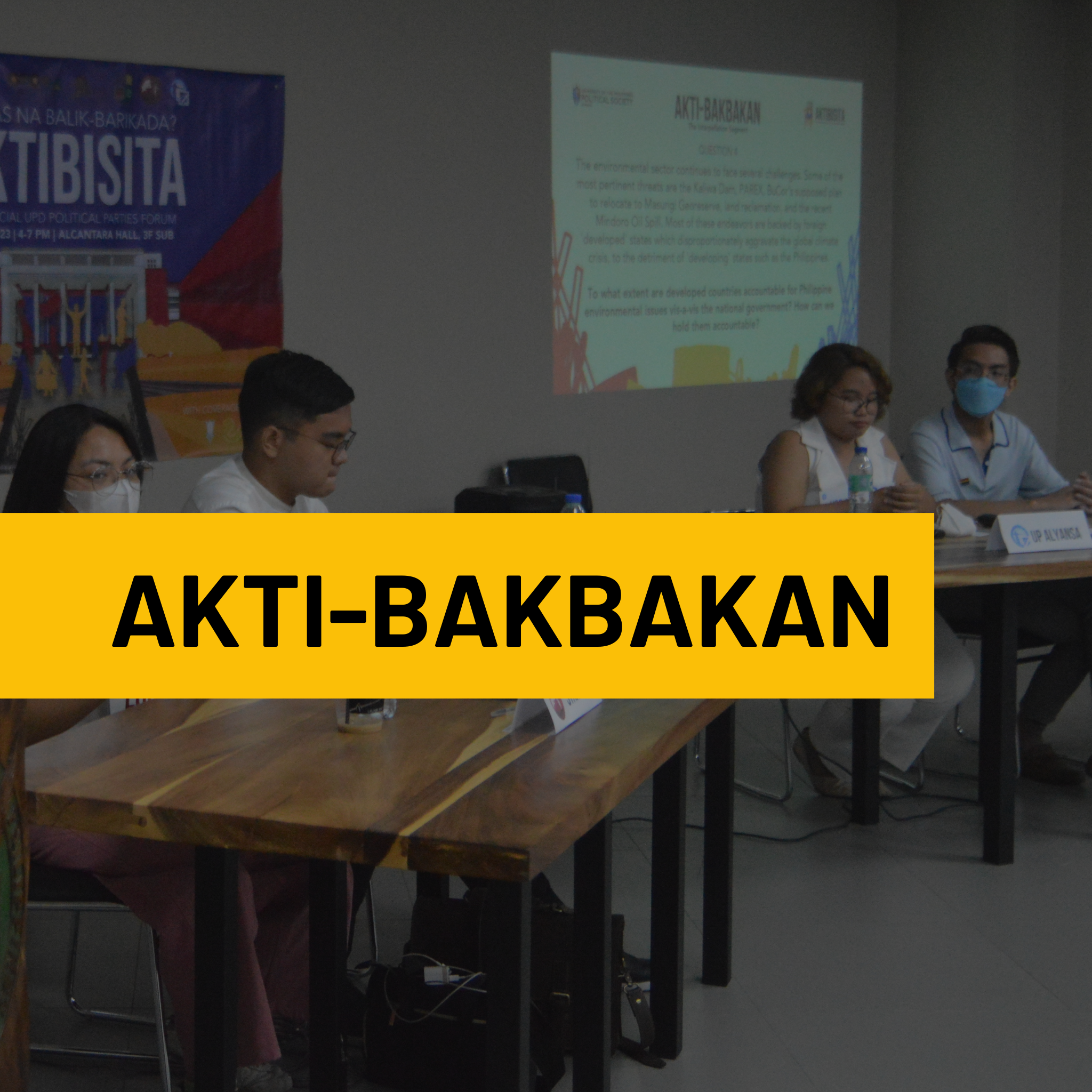

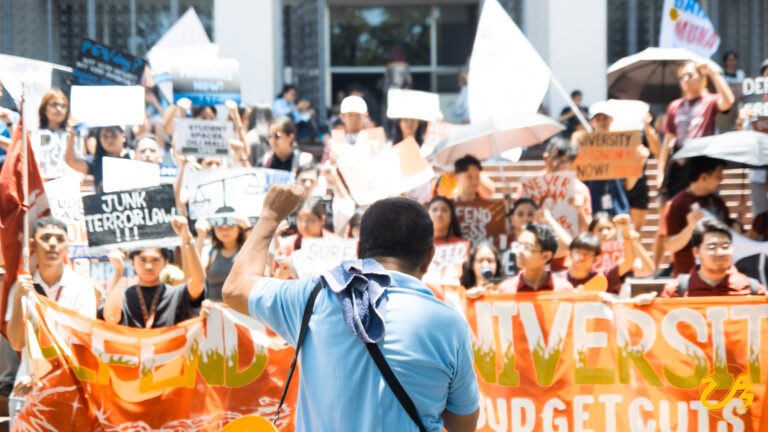
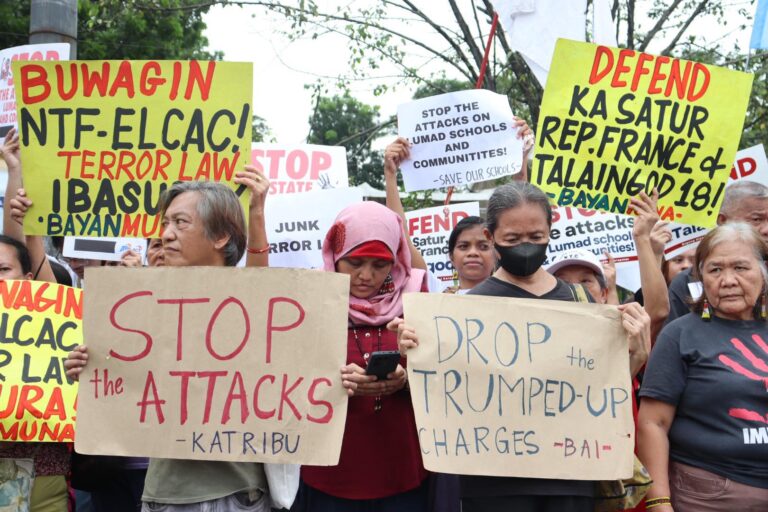

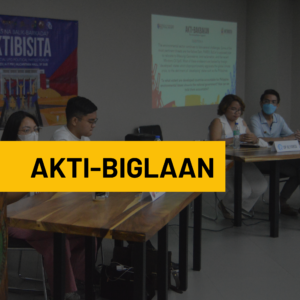
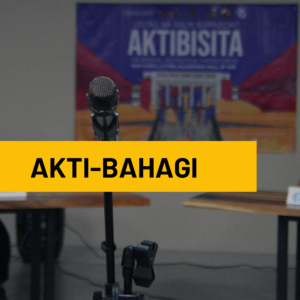
A lot of of the things you articulate is astonishingly legitimate and it makes me ponder the reason why I hadn’t looked at this with this light previously. This article really did switch the light on for me personally as far as this specific issue goes. However there is 1 factor I am not really too comfortable with and whilst I attempt to reconcile that with the actual central theme of the position, permit me observe exactly what the rest of the subscribers have to say.Very well done.